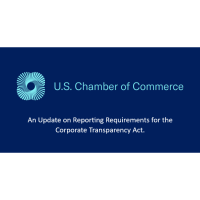Guide: The Latest on the Corporate Transparency Act
A federal judge halted implementation, and unless and until an appellate court overrules or narrows the injunction, no businesses are obligated to comply with the reporting requirements.
A federal court in Texas on December 3rd halted the implementation of the Corporate Transparency Act’s (CTA) beneficial ownership reporting requirements. Holding that the CTA is likely unconstitutional, the court issued a preliminary injunction barring the government from enforcing the CTA and its reporting requirements against anyone.Prior to the ruling, small businesses that met certain criteria would have had to file reports with the Department of the Treasury by January 1, 2025, or risk fines and criminal penalties.
The preliminary relief will remain in effect until the conclusion of legal proceedings, at which point the court may enter a permanent injunction. In the meantime, the government will likely appeal the preliminary injunction.
Unless and until an appellate court overrules or narrows the injunction, no businesses are obligated to comply with the reporting requirements.
Background on the CTA
The CTA was enacted by Congress on January 1, 2021, as part of the National Defense Authorization Act. The CTA included significant reforms to anti-money laundering laws and is intended to help prevent and combat money laundering, terrorist financing, corruption, and tax fraud.Under the act, small businesses in the United States need to file beneficial ownership information reports (BOIR) with the Department of the Treasury by January 1.
Failure to submit the new paperwork by the deadline puts small business owners at risk of criminal penalties, imprisonment, and fines up to $10,000.
This information was provided by the U.S. Chamber of Commerce.


